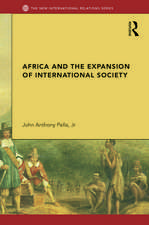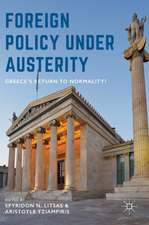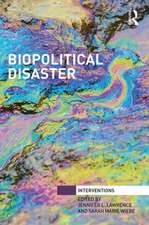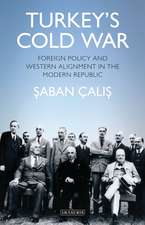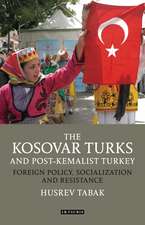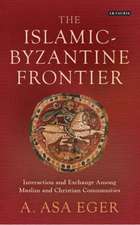At Europe's Edge: Migration and Crisis in the Mediterranean
Autor Ċetta Mainwaringen Limba Engleză Paperback – 27 apr 2023
| Toate formatele și edițiile | Preț | Express |
|---|---|---|
| Paperback (1) | 182.35 lei 10-16 zile | +55.67 lei 7-13 zile |
| OUP OXFORD – 27 apr 2023 | 182.35 lei 10-16 zile | +55.67 lei 7-13 zile |
| Hardback (1) | 522.02 lei 31-37 zile | |
| OUP OXFORD – 5 sep 2019 | 522.02 lei 31-37 zile |
Preț: 182.35 lei
Preț vechi: 224.07 lei
-19% Nou
Puncte Express: 274
Preț estimativ în valută:
34.89€ • 36.56$ • 28.84£
34.89€ • 36.56$ • 28.84£
Carte disponibilă
Livrare economică 11-17 martie
Livrare express 08-14 martie pentru 65.66 lei
Preluare comenzi: 021 569.72.76
Specificații
ISBN-13: 9780198881827
ISBN-10: 0198881827
Pagini: 240
Dimensiuni: 154 x 234 x 14 mm
Greutate: 0.36 kg
Editura: OUP OXFORD
Colecția OUP Oxford
Locul publicării:Oxford, United Kingdom
ISBN-10: 0198881827
Pagini: 240
Dimensiuni: 154 x 234 x 14 mm
Greutate: 0.36 kg
Editura: OUP OXFORD
Colecția OUP Oxford
Locul publicării:Oxford, United Kingdom
Recenzii
The way that Mainwaring cements her discussion in ongoing empirical evidence is one of the greatest joys in this book ... I found myself hooked by her attention to detail and have been following emerging events throughout this year as a result of the interest she has managed to pique. For Mainwaring this is not just research; At Europe's Edge reflects the determination of a type of academic activism (an intervention) that has been present in all the work of hers I have read to date.
At Europe's Edge: Migration and Crisis in the Mediterranean [is] an impressively comprehensive and polished piece of work, addressing discourses, policy and security in relation to migration in the Mediterranean, based on a methodologically robust study. The book eloquently weaves together the historical evolution of border policy and migration in the Mediterranean, while also bringing the current realities into focus ... The author does not only centre migrant voices, but skilfully brings her interlocutors to life, by capturing in a few words their character, background or the impression that encounter left on her.
It's all there, surgically taken apart by Ċetta Mainwaring in her excellent At Europe's Edge. Anyone who is serious about migration should buy and read this book.
At Europe's Edge is a compelling account ... [and] a valuable resource; it is relevant not only for scholars of governance and migration research but also for the interested public, migrants' advocates, and politicians alike... Mainwaring's book is timely and much-needed, as dehumanizing events like the tuna-pen incident still happen, as a glance at recent news reports from April 2020 reveals.
From gripping opening to thoughtful ending, Ċetta Mainwaring adroitly locates Mediterranean crossings at the cutting edge of intellectual and political debate. At Europe's Edge demands that readers move border-crossers and small island states where they land from margin to centre.
At Europe's Edge offers an authoritative and accessible account of the social, political, and cultural construction of Europe's so-called 'migration' crisis. Mainwaring draws on a decade of ethnographic research to historicize the dominant 'crisis' narrative, to foreground the agency of actors presumed to be marginal in shaping Mediterranean space, and to emphasize the everyday production and contestation of Europe's borders. The result is a major new intervention that deserves urgent attention — this book will shape interdisciplinary debates about one of the most pressing public policy issues in the twenty-first century.
At Europe's Edge: Migration and Crisis in the Mediterranean [is] an impressively comprehensive and polished piece of work, addressing discourses, policy and security in relation to migration in the Mediterranean, based on a methodologically robust study. The book eloquently weaves together the historical evolution of border policy and migration in the Mediterranean, while also bringing the current realities into focus ... The author does not only centre migrant voices, but skilfully brings her interlocutors to life, by capturing in a few words their character, background or the impression that encounter left on her.
It's all there, surgically taken apart by Ċetta Mainwaring in her excellent At Europe's Edge. Anyone who is serious about migration should buy and read this book.
At Europe's Edge is a compelling account ... [and] a valuable resource; it is relevant not only for scholars of governance and migration research but also for the interested public, migrants' advocates, and politicians alike... Mainwaring's book is timely and much-needed, as dehumanizing events like the tuna-pen incident still happen, as a glance at recent news reports from April 2020 reveals.
From gripping opening to thoughtful ending, Ċetta Mainwaring adroitly locates Mediterranean crossings at the cutting edge of intellectual and political debate. At Europe's Edge demands that readers move border-crossers and small island states where they land from margin to centre.
At Europe's Edge offers an authoritative and accessible account of the social, political, and cultural construction of Europe's so-called 'migration' crisis. Mainwaring draws on a decade of ethnographic research to historicize the dominant 'crisis' narrative, to foreground the agency of actors presumed to be marginal in shaping Mediterranean space, and to emphasize the everyday production and contestation of Europe's borders. The result is a major new intervention that deserves urgent attention — this book will shape interdisciplinary debates about one of the most pressing public policy issues in the twenty-first century.
Notă biografică
Ċetta Mainwaring is an author and activist. She is currently a Lecturer in Sociology at the University of Glasgow. She holds a DPhil in International Relations from the University of Oxford and an MA in Sociology from City University, London. Dr Mainwaring's research examines migration, borders, and resistance. She is interested in how people move, seek asylum, and resist bordering practices. Her research has analysed how EU member states seek to control migration in the Mediterranean region and how these policies shape migrant experiences. She previously co-led a collaborative, cross-regional project, 'Clandestine Migration Journeys', which examined the everyday experiences of migrants and the ways they challenge and overcome restrictive policies and barriers they face along the route. She currently holds a UKRI Future Leaders Fellowship examining immigration detention, the way this failed policy travels internationally, and resistance to it in the UK, US, and Australia.

